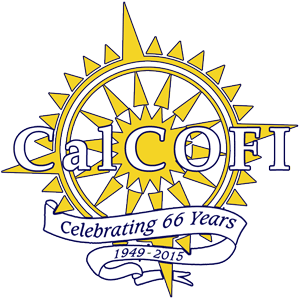
2015 CalCOFI Conference
The 2015 CalCOFI Conference was held at the Monterey Bay Aquarium Research Institute (MBARI) in Moss Landing, CA, from Dec. 14-16 (Directions). Thanks to everyone who participated, we hope to see you next year.
CalCOFI Conference 2015 Program (PDF)
The symposium of the conference entitled “What Can Animal Telemetry Tell Us About Fisheries, MPAs and Nearshore Oceanography in the California Current" was convened by Dr. Laura Rogers-Bennett, California Dept. of Fish and Wildlife. Contributed papers and posters were accepted on a variety of marine topics.
El Niño Workshop Dec 16, 2015
CalCOFI and the Center for Ocean Solutions co-hosted a science workshop to discuss the 2015 El Nino and the potential impacts this event might have on the California Current, California Fisheries and the wider Pacific Ecosystem. This workshop was intended as a venue to share information, plan for the collection of critical data and discuss implications for marine life management. We hope you were able to attend the workshop at MBARI, 7700 Sandholdt Rd., Moss Landing, CA from 9am to 2 pm.
All information regarding the conference can be found at the CalCOFI conference website at:
http://oceaninformatics.ucsd.edu/calcofi/conference/
| Conference-related communications should be addressed to: | Symposium questions should be addressed to: | ||||||||||||||||||
| John Heine | Dr. Laura Rogers-Bennett | ||||||||||||||||||
| CalCOFI Conference Coordinator/Editor CalCOFI Reports | Telephone: (707) 875-2035 | ||||||||||||||||||
| NOAA-SIO-Cal. Fish and Wildlife | E-mail: This email address is being protected from spambots. You need JavaScript enabled to view it. | ||||||||||||||||||
| Jacksonville University, Marine Science Research Institute | |||||||||||||||||||
| 2800 University Blvd. N | |||||||||||||||||||
| Jacksonville, FL 32211 | |||||||||||||||||||
| Telephone: (904) 521-3526 | |||||||||||||||||||
| E-mail: This email address is being protected from spambots. You need JavaScript enabled to view it. | |||||||||||||||||||
Call For PapersVerbal Presentations - A limited number of 15 minute contributed verbal presentations (~16) will be accepted, related to the symposium topic or the biology, physics, chemistry, geology, meteorology, politics or economics of the California Current System, its adjacent waters, and Eastern Boundary Currents. Abstracts of papers for verbal presentations must be received by the Conference Coordinator (John Heine: This email address is being protected from spambots. You need JavaScript enabled to view it.) by 6 November, 2015. These abstracts will be reviewed by a selection committee and authors will be notified of the acceptance of their submission soon thereafter. Poster presentations - It is not anticipated that poster presentations will be limited in number. In order for poster titles to be included in the conference program, they should be received by the Coordinator by 6 November. Sample Abstract Format: Times New Roman font, size 12, center justify title, authors, and affiliations, full justify text.
Dress, Climate, And FacilitiesIn December, the weather can be cool, so appropriate dress should be considered. Dress for conference sessions is casual. For your convenience we have obtained special conference rates from the Hyatt Regency Monterey, The Inns of Monterey, and the Best Western Seacliff Inn. Ask for the CalCOFI Conference rate when you make your reservation. TransportationThe nearest airports are Monterey (about 20 miles) or San Jose (about 60 miles). Ground transportation is limited. Parking at MBARI is limited, and it is recommended that you carpool from your hotel. Go to this official Conference webpage (link) for additional info on hotels and registration.Registration is overThe Coordinator must receive the $250 registration fee by 1 December. Late registration fee will be $300. Please be aware ALL attendees need to register for the conference, including symposium speakers. There are three payment options on the registration form: Check or Money Order (US dollars, made payable to "CalCOFI"), Agency Purchase Order or through PayPal, either by using a credit card or a PayPal account. These are explained in more detail below to help you with your registration. We cannot accept foreign currency or checks from foreign banks. PAYMENT OPTION INFORMATION PayPal: Since we cannot accept foreign currency or checks from foreign banks, PayPal is an option that enables our foreign participants to prepay their registration fee. Participants may use a credit card (Visa, MasterCard, AMEX or Discover) or a PayPal account. After submitting your registration form you will be directed to PayPal for this transaction. Agency Purchase Order: For individual participants please specify agency. For those submitting the purchase order, you can either fax or email. Check or Money Order payable in US dollars from a US bank to "CalCOFI": Upon completion of your registration form you will be given the mailing address to mail your check or money order. Registration fee: $250 Graduate Student: Registration fee reduced to $150. Financial AssistanceLimited financial assistance will be available to graduate students who are presenting. Requests for financial aid will be considered in the order that they are received and requests should be made no later than 1 November to the attention of the Conference Coordinator (John Heine). |
|||||||||||||||||||
